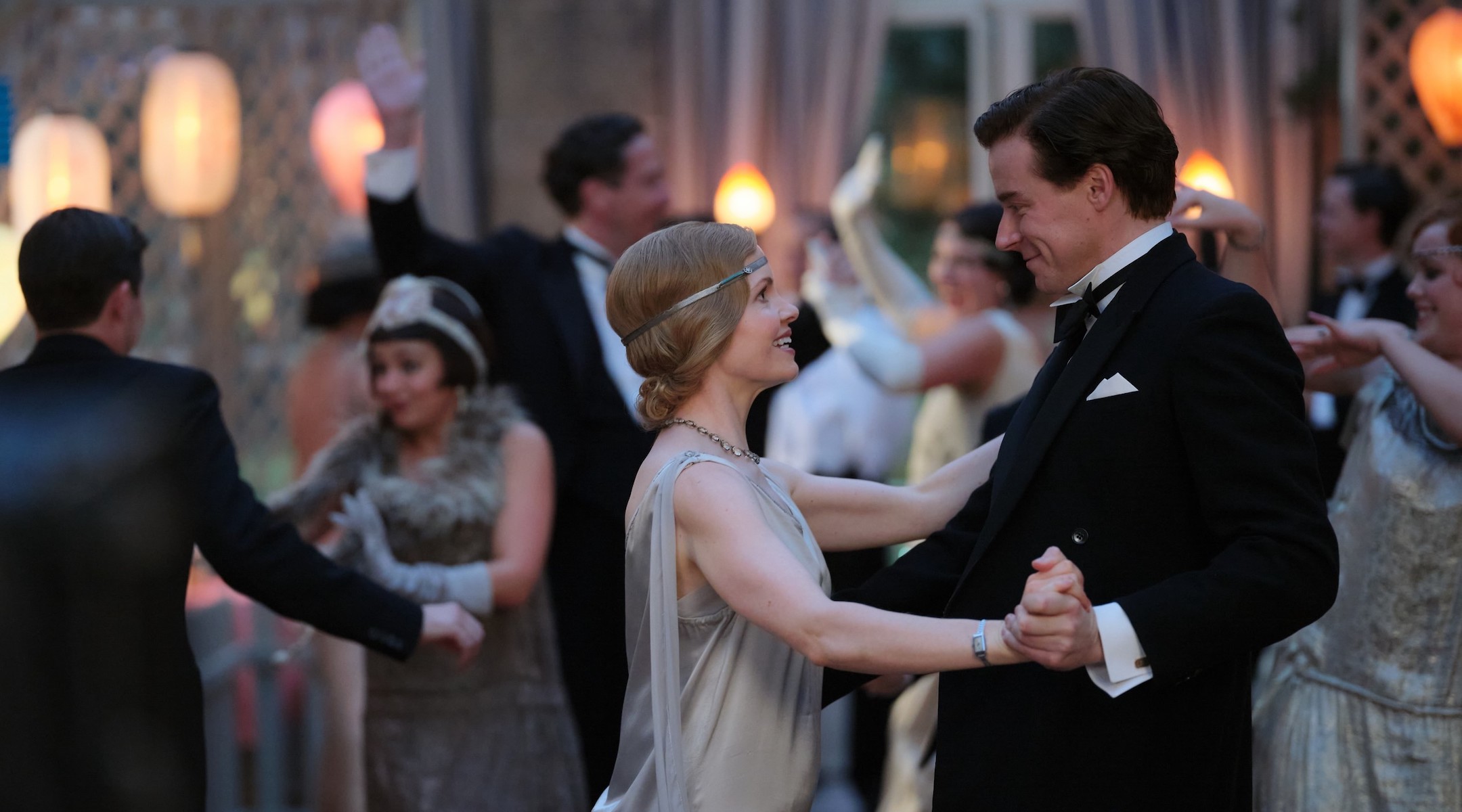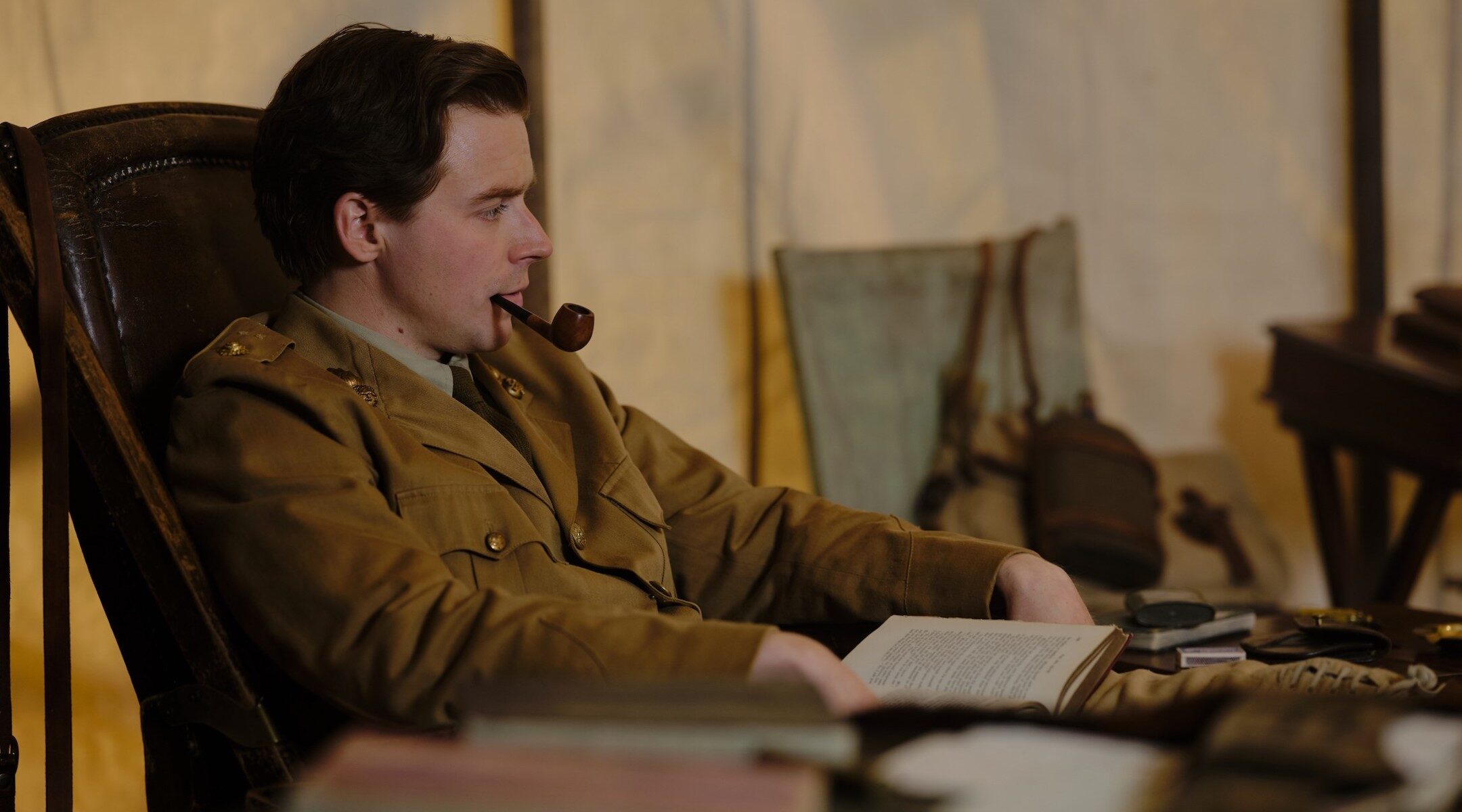(JTA) – “Benediction,” a new biopic of the British anti-war poet Siegfried Sassoon, opens with a Sassoon poem called “Concert Interpretation.” In it, the author describes a British audience’s enthralled reaction to a Stravinsky opera (“The audience pricks an intellectual ear…”).
The film, splicing together newsreel footage of British soldiers dying in the trenches of the Eastern Front, juxtaposes this against Sassoon’s own horrifying experiences of World War I, which the same audience is utterly unconcerned with.
It’s a powerful sequence. And it recalls another poem that went viral in recent months: Jewish Ukrainian refugee Ilya Kaminsky’s “We Lived Happily During The War,” which rebounded across social media in the wake of Russia’s invasion of Ukraine. The aristocratic Sassoon (played in the film as a young man by Jack Lowden and as an older man by Peter Capaldi) favored a more delicate, precise rhyming structure than Kaminsky’s modern verse more than a century later, but their goals are the same: to awaken us, the audience, to the horrors unfolding all around us.
Directed by acclaimed British filmmaker Terence Davies, “Benediction” is part of a new wave of interest — which also includes a new biography — in the Sassoon family. Traders in opium, cotton, oil, gold, silver and fine art, the powerful Jewish clan was once known (mostly to antisemites) as “the Rothschilds of the East.” As Jonathan Kaufman explains in his recent book, “The Last Kings of Shanghai,” the story begins in Baghdad, from which the family’s influence spread far beyond the bounds of the Jewish community. “Sassoon” may mean “joy” in Hebrew, but in later generations, the family’s relationship to Judaism would become complicated, to say the least.
Siegfried’s father, Alfred, distanced himself not only from the family trade but also from their faith and heritage, marrying a gentile and seemingly passing on no Jewish customs to his children. He died when Siegfried was young, and does not factor into “Benediction”; the strong male figure in Siegfried’s adult life becomes Robbie Ross (Simon Russell Beale), a respected art dealer known for his closeness with Oscar Wilde.
The film’s Siegfried flaunts his status as a proud member of Britain’s Anglo-Saxon upper class, who comes home to Christmas trees and has visions of German recitations of “Silent Night.” Yet during World War I, he angrily rejects the British Military Cross for valor that is bestowed on him, saying: “It disgusted my own dwindling standards.” (Siegfried’s brother dies in the battle of Gallipoli, the disastrous campaign for control of the waterways that severed Europe and Asia in northwest Turkey.) He perfects his gift for poetry, and fully comes to embrace his homosexuality, when he’s sent to a mental hospital as punishment for his insolence.

Jack Lowden and Kate Phillips in “Benediction.” (Laurence Cendrowicz/Roadside Attractions)
In real life, according to one historian, Siegfried would routinely make antisemitic comments and considered the family fortune ill-gotten due to “dirty trading,” though he willingly partook in its spoils by mingling among Britain’s distinguished ranks. Considering that Jews often had their loyalties questioned during World War I, Sassoon likely didn’t want to give his ideological opponents any more ammunition to doubt the sincerity of his anti-war position.
None of this is discussed in “Benediction,” nor is the film interested in Siegfried’s real-life 1918 sojourn to Ottoman-era Palestine, during which he waxed rhapsodic about Gaza and said Jerusalem was “not a very holy-looking place.” The movie’s Siegfried does joke at one point that his name “sounds Wagnerian” — a reference to the fact that he was named after a Wagner character, but also a possible desire to associate his upbringing with high culture, even a notoriously antisemitic composer, rather than its actual Hebrew origins.
Yet as the title hints, ideas of religion and belonging are still at the forefront of the film’s mind, as Siegfried, a closeted gay man who bounces between partners before marrying a woman to seek security, alternatively rejects and seeks blessings for his conscience-driven actions from family, superiors and lovers. From his authoring of a famous “statement” calling for an end to war, to a surprise late-in-life conversion to Catholicism, he always seems to be asking himself an eternal question: Will my actions make a difference in the end?
The film is reluctant to speculate too much on Siegfried’s reasoning for the conversion, other than to offer that it fits into the poet’s pattern of iconoclastic behavior. He tells his son that Catholicism appeals to him because “it’s something unchanging, permanent” — a way to extract some easy answers, after a lifetime of asking hard questions of authority.
Davies, the director, is a lover of pastoral period pieces whose previous film, “A Quiet Passion,” similarly portrayed a different poet, Emily Dickinson, as a creature of her social engagements as well as of her own mind. Likewise, Davies’ approach in “Benediction” focuses on Sassoon’s duality, the way he seemed to be able to carry on a charmed social life — enjoying multiple same-sex relationships more or less out in the open in the 1920s — even as he felt deeply in his bones that his country was sentencing his fellow soldiers to needless deaths.
One might say he lived happily, yet haltingly, during the war.
“Benediction” opens June 3 in select theaters.
JTA has documented Jewish history in real-time for over a century. Keep our journalism strong by joining us in supporting independent, award-winning reporting.






